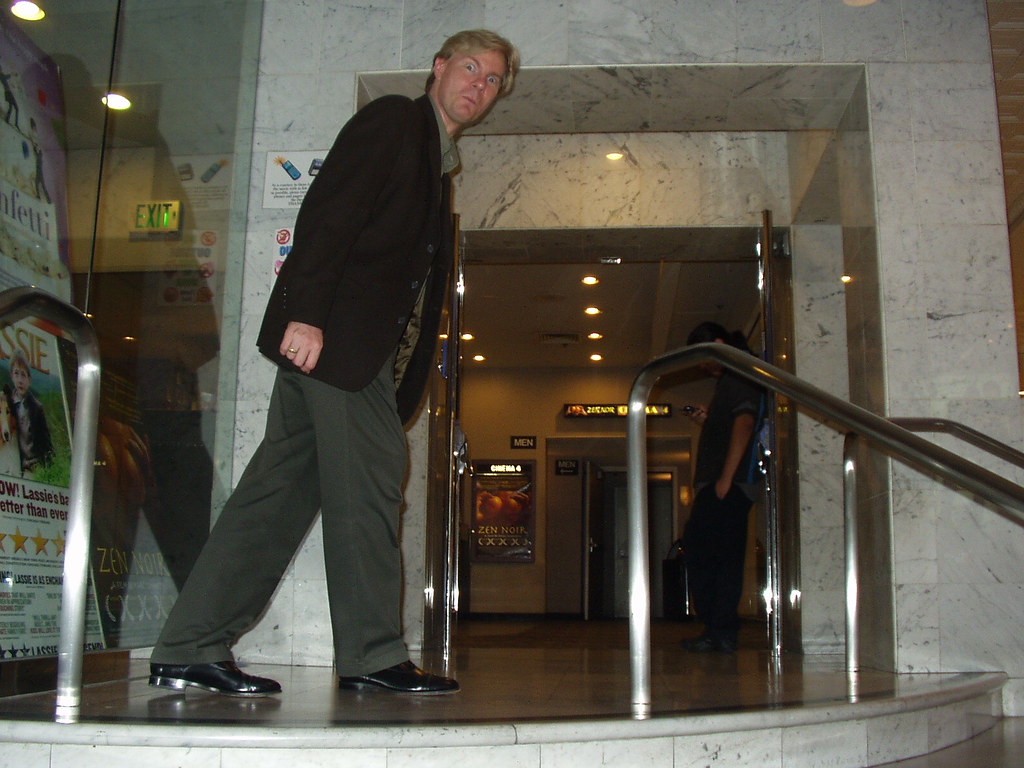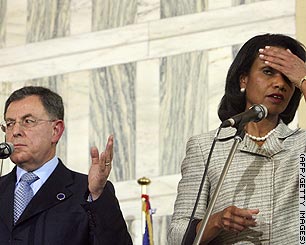I've written often enough about the illegal immigration issue (
here,
here and
here, particularly), so I would have been interested anyway when I saw that Morgan Spurlock's
30 Days program was focusing its second-season opener on the question. But I happen to like the show a lot, so I would've watched anyway. Spurlock is all about life in the real world: he isn't an ideologue, he's someone who asks a question and then tries to find a real, practical answer, usually by going out and living the question and its consequences. In his breakthrough documentary
Super Size Me, he subjected his own body to a month of nothing but McDonald's food to see what would happen (it wasn't good); and when he started
30 Days on the fx Channel, he and his girlfriend moved into a crappy apartment for thirty days and lived on nothing but the minimum wage jobs they could get. Again, it was unpleasant for them but revelatory for the audience. Subsequent episodes usually found other participants because Spurlock would probably die if he pulled this stunt too often; but it turned out to be inspired, because putting someone of one viewpoint into the life of someone with another viewpoint may just be the best way, in our media culture, to produce a real
Socratic dialogue.
Even so, I found myself deeply moved by this particular episode. The premise was simple: a member of the
Minutemen named Frank George moved in with a family of undocumented Mexicans in East L.A. Frank, in an example of particularly good casting, turned out to be a Cuban-born legal immigrant who came to the U.S. with his parents after Fidel happened. (No one ever comments on the fact that his parents apparently had contacts with a U.S. corporation that helped them get documentation--just the sort of wealthy contacts that most Mexican and Central American workers simply don't have. If they did, they wouldn't need to cross the border illegally in the first place. It is the absence of other choices that makes them illegal, as this program would go on to demonstrate convincingly.) What this meant was that, on the one hand, Frank spoke fluent Spanish and was able to communicate easily with the family that took him in; on the other hand, it made him a little self-righteous sometimes about how the path he took to legal status was the one everyone should take. Again: I'm sure most people would, if that option was realistically available to them.
I thought both sides of the issue were well-represented: Frank seemed a true representative of his ideology, although his arguments were a bit limited, usually turning on the idea that this is a nation of laws and, by definition, illegal immigrants are here illegally, therefore they should be deported. The "Gonzalez" family were warm, welcoming, hard-working people making slow steps toward achieving what everyone refers to as the American Dream: opportunity and hard work equals advancement. Their daughter Armida, a 3.8 honors student at her school, was the standout child, widely liked by her teachers and with a wealth of possibilities opening up to her. At the beginning of Frank's time with the family, Armida was hoping to be accepted to Princeton. (How she can be accepted into any college when she's here illegally was never addressed; presumably there's something I don't know about how one's citizenship status interacts with admissions policies.) The Gonzalezes simply insisted that all they wanted was a better life and more opportunities for their children; and the father, Rigoberto, was perfectly up-front about hoping, after a hypothetical amnesty, to one day be able to open his own business, when he would without compunction hire more undocumented workers like himself. (Whether he would then be exploiting his own people is also a question that was never addressed.)
Frank, despite personally liking the Gonzalezes, wasn't about to bend on his principles; then someone came up with the brilliant idea of sending him to Mexico to meet the family the Gonzalezes left behind. This is when the show became really powerful. He saw the hovel the family had once lived in, a roofless pile of cinder blocks without any electricity or plumbing, where water was provided by running a hose from a brackish, almost-certainly infested well dozens of yards away. The conditions were horrifying, and suddenly that 500 square-foot apartment they live in now in East L.A. seemed palatial. Frank met the grandparents who some of the kids have never met, and as a basically decent guy he took some video and showed it to them when he got back to the States.
The question then became: would this experience change Frank's mind? Strictly from watching the show, yes he did, but not entirely: he decided not to go to the border anymore but still supports the stricter version of immigration legislation that was passed by the House. Since the show aired I have seen some reports that Frank felt his "change of heart" was taken out of context, and maybe that's so. But that doesn't diminish the effectiveness of the experience on a random viewer like myself.
Before this gets too long, just a couple points. If, as Frank kept insisting, the problem with illegals is that they're illegal, then what happens if, say, the Senate version of immigration policy is made into law? That would allow a "path to citizenship," and in one of the show's more interesting moments he declared that he was firmly opposed to this version of legislation. But if it did pass, and became law, then would he as a law-abiding citizen support and enforce it? Unfortunately, the participants in this discussion veered away from that question, so I can only guess that Frank would declare it a "bad law" and agitate against it. Trouble is, that in itself pokes a giant hole in his "nation of laws" argument--apparently, we are only to be a nation of laws that Frank likes. And with that, much of the strength of his arguments collapses.
Laws, after all, are not monolithic: we are not meant to serve the law, the law is meant to serve us. If you feel a law is good, great; if you feel a law is bad, then argue against it. Fight against it if you must. (If, for example, a law was ever passed that abridged the freedom of speech, you can bet I would fight against it vigorously.) The question of whether one should simply slavishly follow any law was dealt with pretty effectively at Nuremburg. So, then, Frank does not dislike illegal immigration because it's illegal, he dislikes it because he dislikes it. That's fine, I have no problem with his not liking something; but he needs to be honest with himself and realize that the core of his argument is hollow and he needs a better argument.
Then there's the practical question, which cannot and should not be disassociated from emotional issues. Should we let our raw sentimentality dissuade us from a carefully-considered ethical position? Not usually, no. But after seeing the awful conditions this one family faced when they lived in Mexico, how could anyone with any kind of a soul possibly want to send them back? And given that there are something like eleven million undocumented workers in America, if you sent them all back
en masse, where do you think they would live? Probably in conditions that would make that wretched hovel look like a palace.
I absolutely agree that something must be done in Mexico to improve the lives of its citizens. But I say that instead of getting all worked up about the poor workers driven to the desperate point of becoming criminals just to improve their lives a little, I say let's turn our energies to the betterment of Mexico as a whole. That would solve the problem in a way that's good for absolutely everybody, and I just can't imagine why this isn't what everyone is talking about.
POSTSCRIPT: I went on the internet looking for other responses to this powerful program, wanting to read a few reviews from people who had been as moved as I was. Instead, I found
this. Oh my heavens. It didn't seem possible that anyone could watch that program and not be moved, and yet here they are, in their numbers. One commenter wrote "[M]y question is why did they not use a red blooded white American person from the Minutemen? Not to be a racist but, Frank did mention he was from Cuba." Yep, that's not racist at all. Oy.
In a
web posting, Frank declares that his real change of heart comes in the shape of deciding to start lobbying politicians directly to close down the border, rather than patrolling the border himself. "This change in me was caused by living in a former USA city [East L.A.] that is now a Mexican city to the point that as I wandered the streets I asked the illegals if this city reminded them of a Mexican city and they said yes, Guadalajara Mexico." This, apparently, was a great shock to him.
But parts of Chicago once looked a lot like Krakow. Parts of New York, San Francisco, Los Angeles and other major cities still look a lot like parts of China and/or Korea. And Boston, as I can tell you from personal experience, looks a hell of a lot like Dublin. So what? That's kinda what they mean by "melting pot." The Polish part of Chicago has been mostly assimilated; the assimilation of the Irish and Italians was completed long ago. That's how this works. The fact that part of a U.S. city has changed recently so that it resembles a Mexican city is really not a big deal. I live in L.A., and trust me, it ain't no "former USA city," and the overwhelming majority of it doesn't look like Guadalajara.





